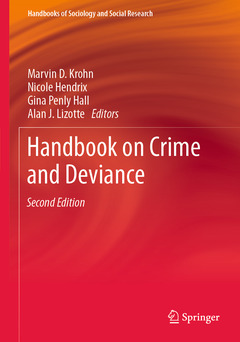Description
Handbook on Crime and Deviance (2nd Ed., 2nd ed. 2019)
Handbooks of Sociology and Social Research Series
Coordinators: Krohn Marvin D., Hendrix Nicole, Penly Hall Gina, Lizotte Alan J.
Language: English
Subjects for Handbook on Crime and Deviance:
Keywords
Sociology of Crime and Deviance; Methodological Issues in Crime Research; Criminology and Criminal Justice; Biosocial Criminology; Self Control Theory; Developmental and Life Course Theory; Desistance of Crime; Crime in Schools; Family Violence; Preventing Crime; Cybercrime and Prevention; Green Criminology; Crime and Unemployment; Terrorism and Crime; Mental Health Issues and Crime; Legal and Illegal Gun Ownership in America
Publication date: 09-2020
Support: Print on demand
Publication date: 09-2019
Support: Print on demand
Description
/li>Contents
/li>Biography
/li>Comment
/li>
I. Methodological Issues in Criminological Research; Alan Lizotte.- 1. Place-Based Data, Methods and Analysis: Past, present, and Future; Martin Andresen and Tarah Hodgkinson.- 2. NIBRS as the New Normal: What Fully Incident-Based Crime Data Mean for Researchers; Lynn A. Addington.- 3. Ethical Controversies In Engaged Research Nicole Janich and David E. Duffee.- 4. Victimization at Schools and on College and University Campuses: Historical Development and Applications of Opportunity Framework, Leah C. Butler, Teressa C. Kulig, Bonnie S. Fisher and Pamela Wilcox.- II. Explanations of Crime; Marvin D. Krohn.- 5. The Biosocial Perspective: A Brief Overview and Potential Contributions to Criminological Theory; Joseph A. Schwartz, Anthony Walsh and Kevin M. Beaver.- 6. The Social Learning Theory of Crime and Deviance; Ronald L. Akers and Wesley G. Jennings.- 7. Self-Control Theory: Theoretical and Research Issues; Michael Rocque and Alex R. Piquero.- 8. General Strain Theory; RobertAgnew and Timothy Brezina.- 9. Institutional-Anomie Theory: An Evolving Research Program; Steven F. Messner, Richard Rosenfeld and Andreas Hövermann.- 10. Labeling Theory; Jón Gunnar Bernburg.- 11. Social Disorganization Theory: Past, Present and Future, Charis E. Kubrin and Michelle D. Mioduszewski.- 12. Social Support and Crime; Cecilia Chouhy.- 13. Control Balance Theory of Deviance; Charles R. Tittle and Cindy Brooks Dollar.- 14. Situational Action Theory: A General, Dynamic and Mechanism-Based Theory of Crime and its Causes; Per-Olof H Wikström.- 15. Developmental and Life-Course Theories of Crime and Deviance; Jeffrey T. Ward.- 16. The “Great American Crime Decline”: Possible Explanations; Maria Tcherni-Buzzeo.- III. Criminal Justice Issues.- 17. Targeted Policing for Crime Reduction; Anthony A. Braga and Lisa Barao.- 18. Situational Crime Prevention: Theory, Practice and Evidence; John E. Eck and Ronald V. Clarke.- 19. Desistance from Crime: Past to Present; Michael Rocque and Lisa Slivken.- 20. American Capital Punishment Over Changing Times: Policies and Practices; James R. Acker.- 21. Mental Illness and the Criminal Justice System: Issues and Considerations; Erin M. Falconer.- 22. Hate Crimes: Perspectives on Offending and the Law; Ryan D. King.- 23. Cybercrime; Catherine D. Marcum and George E. Higgins.- IV. Special Topics in Crime and Deviance.- 24. The Crucial Role of Friendships and Peer Relationships in the Etiology of Crime, Deviance, and Substance Use; John H. Boman, IV.- 25. Youth Gangs: Structures and Group Violence; James C. Howell.- 26. Comorbidity of Substance Use and Violence; Helene R. White, Fiona N. Conway, and Judit H. Ward.- 27. Shots in the Dark: Enlightening the Gun Control Debate; Richard L. Legault, Nicole Hendrix and Alan J. Lizotte.- Chapter 28. Family Violence and Delinquency; Timothy O. Ireland, Carolyn A. Smith and Cheyenne Loveland.- 29. Environmental and Green Crime; Matt Nobles.- 30. Employment, Crime, and Devianceacross the Life-Course; John M. Eassey.- 31. Terrorist Decision-Making, Ideology and Counterterrorism; Rose Bellandi.
These books may interest you

Routledge Handbook on Deviance 64.97 €

Routledge Handbook on Deviance 318.24 €


